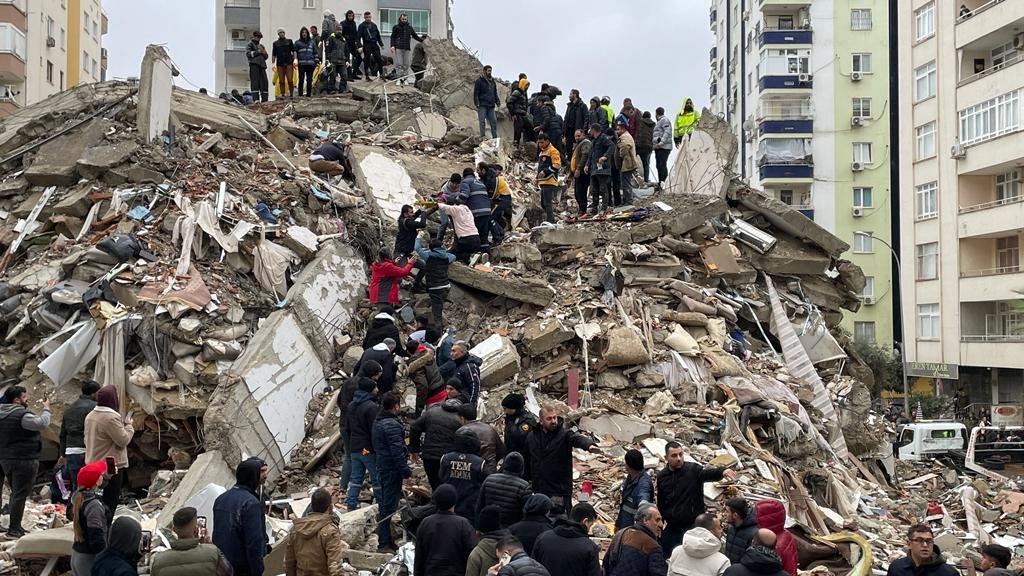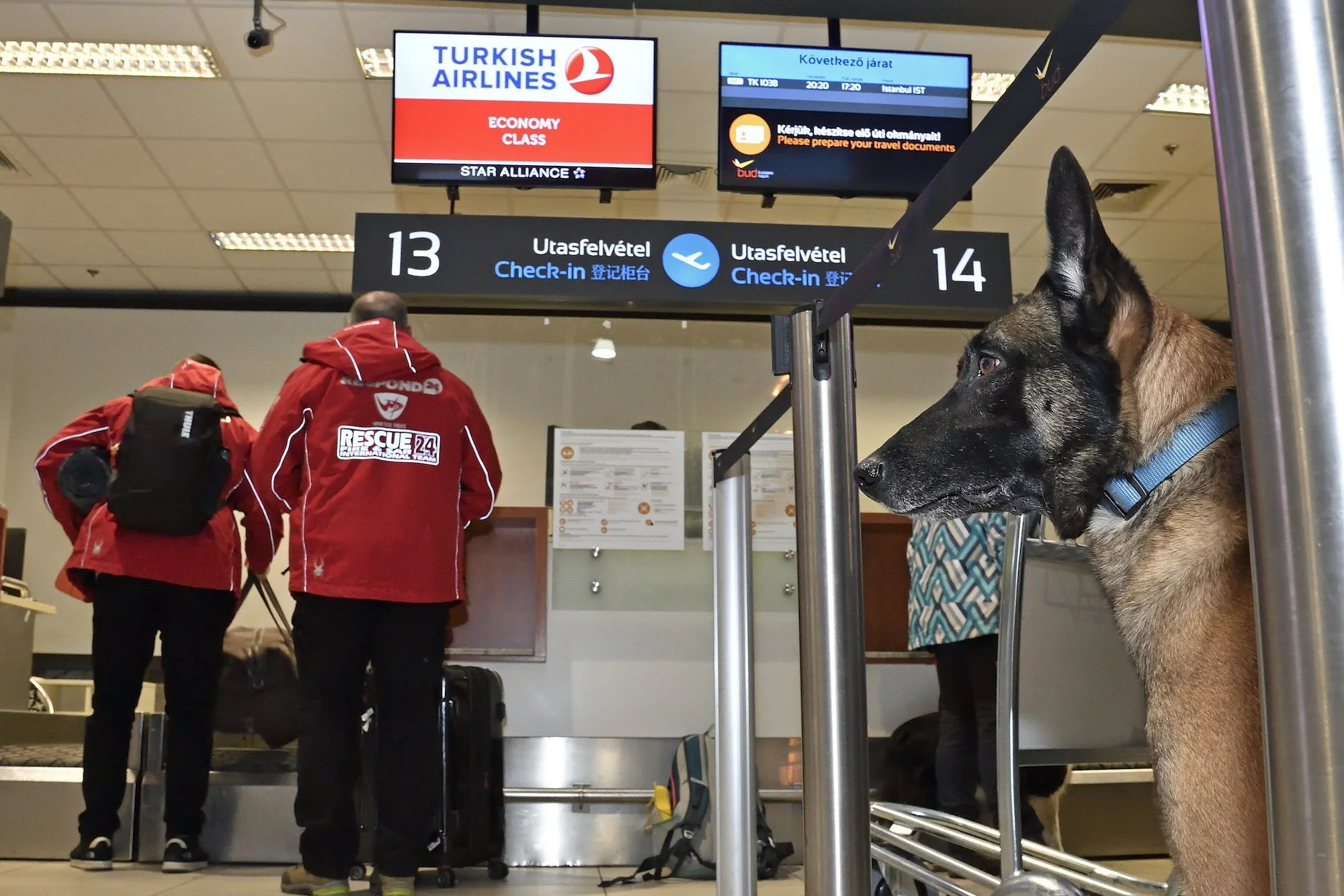Major earthquakes hit Turkey and Syria, number of casualties still rising
Locals searching for survivors in Adana. TurkPhoto: EREN BOZKURT/Anadolu Agency via AFP
Last updated: Feb. 13,11:00 p.m.
Update: at least 37,000 people dead in Turkey and Syria.
According to local officials, several buildings collapsed, leaving at least 1,300 people killed and thousands wounded in the two countries. The number of casualties is still rising as thousands of rescue workers are looking for people trapped under the rubble.
In his latest announcement, Turkish President Tayyip Erdogan said at least 912 people were killed, 5,383 injured, and 2,818 buildings had collapsed. President Erdogan also noted that he could not predict how much the death toll would rise as the rescue works continue.
According to the Syrian state news agency, at least 476 people are dead and at least 1,042 injured, mostly in the regions of Aleppo, Hama, Latakia, and Tartus. In the opposition-controlled northwestern part of Syria, rescuers reported at least 150 people dead and 350 injured.
According to the U.S. Geological Survey, the 7.8 quake struck at a depth of 17.9 km and the epicenter was at Kahramanmaras, near the Turkish town of Gaziantep. Strong aftershocks have been felt in southern and central Turkey. The first one with a magnitude of 6.7 occurred about 32 kilometers (20 miles) northwest of the main quake’s epicenter. The next intense aftershock with a magnitude of 5.6 was registered 19 minutes after the main quake. Tremors of the main quake were felt in the Turkish capital of Ankara, 460 km (286 miles) northwest of the epicenter, as well as in Cyprus, and Lebanon.
Another major quake with a magnitude of 7.7 hit the area before noon CET.
Monday’s first earthquake is believed to be the strongest to hit Turkey since 1939 when a similar magnitude quake killed 30,000 people.
Rescue teams are on the way
Leaders of the European Union, and NATO Secretary General Jens Stoltenberg assured Turkey and Syria of their support for the earthquake. Janez Lenarcic, the EU commissioner responsible for crisis management, said in a Twitter message that following the morning earthquake, the European Union activated the EU civil protection mechanism and is coordinating the dispatch of rescue teams from Europe through its emergency coordination center. The rescue units of the Netherlands and Romania are already on their way, the EU commissioner added.
Another eight countries, Bulgaria, Croatia, the Czech Republic, France, Greece, Poland, Italy, and Hungary, are also sending rescue teams to the region affected by the earthquake.
The Romanian disaster management is sending its special unit (RO-USAR), trained to search and rescue survivors, to Turkey to help the local authorities in rescuing the victims of the earthquake - Romania announced on Monday. RO-USAR soldiers, two search dogs, doctors, and assistants of the Romanian emergency rescue service (SMURD) flew to Adana, Turkey on Monday afternoon with a Helcules C-130 and a C-27 Spartan military aircraft of the Romanian Air Force.
Foreign Minister Jan Lipavsky announced, that the Czech Republic is sending a special rescue team of 68 people to Turkey. The Czech rescue team with specially trained dogs specializes in searching for survivors under the ruins of collapsed buildings and also worked in Beirut, Lebanon, in 2020.
Serbia is sending two teams - each with 12 people - along with liaison officers, for rescue and search tasks, clearing the ruins, and moving heavy debris.
Search-rescue teams left Hungary on Monday
Budapest, February 6, 2023. Members of the Hungarian Baptist Aid special rescue team and one of their search dogs leaving for Turkey at Ferenc Liszt Airport. MTI/Péter Lakatos
The Hungarian special disaster management unit, the Hunor rescue team, left for Turkey on Monday afternoon. The Hunor team, consisting of firefighters, military doctors, and emergency service staff, with 55 people, search dogs, and 90 tons of equipment, flew with the Airbus 319 plane of the Hungarian Armed Forces from Budapest Airport to Adana Airport in Turkey.
The Baptist World Aid also sent a special unit from Hungary to the earthquake-hit region of Turkey. The HUBA Rescue24 International Firefighting and Search-Rescue Team and an emergency medical team - a total of 19 people with 7 rescue dogs and about 2 tons of equipment - left Budapest on Monday afternoon.
Tuesday early morning, Caritas Hungary, the official aid organization of the Hungarian Catholic Church, set out a Hungarian volunteer team with 19 people, 5 vehicles, and 2 trailers to the earthquake-hit area, where they will join Turkish partner organizations. The team, capable of self-sufficiency for a week, can perform urban search and rescue, technical rescue, rope rescue, medical, canine research, and management tasks - reports the Hungarian news agency.
Update: the number of Hungarian rescue teams in the earthquake affected area has risen to7, with a total of 156 people and 28 rescue dogs searching for survivors.
Sources: CNN, Reuters (see links above), MTI - Hungarian News Agency
Related: Turkey-Syria earthquake: how to offer help from Szeged

